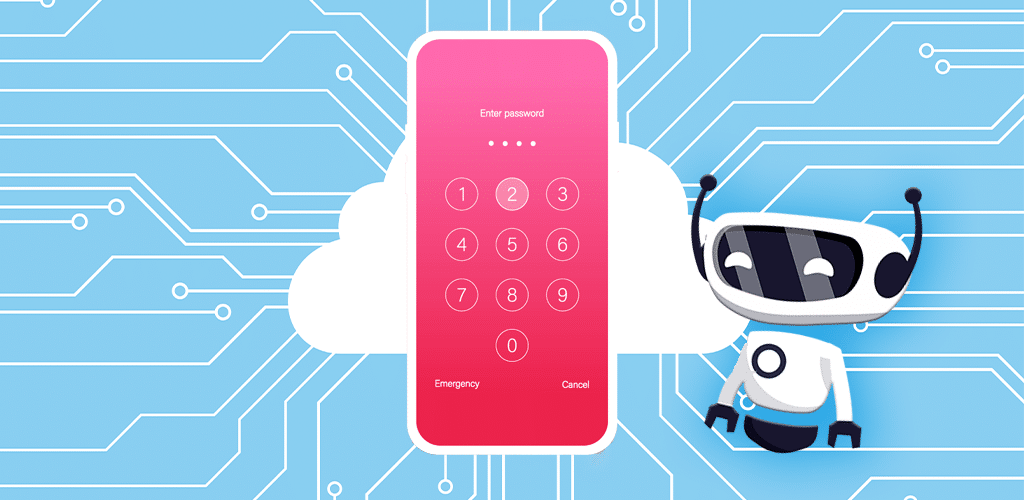November 5, 2019
Privacy Tip of the Week: Protect Your Smartphone
Posted by Rhiannon

- Use a pass code
- Enable remote wiping
- Keep software up-to-date
- Don’t access public wi-fi
- Write down the IMEI
- Guard your SIM card
- Be selective with the apps you install
- Beware strange links
Use a Pass Code
The first step to protecting any digital device is also the easiest: set a pass code. Sure, it may take you a few seconds extra to get into your phone, but the protection it provides is invaluable. While misplacing a phone is an enormous hassle, a pass code takes one less worry away when you don’t have to fear that the data on it can be stolen. A pass code also prevents friends, family, and curious co-workers from snooping. When setting the code, avoid obvious choices like birthdays or “1234.” The harder it is to guess, the more secure it is.
Protect Your Smartphone by Enabling Remote Wiping
If you do happen to lose a phone and don’t have a pass code enabled, your next best bet is to try remote wiping its data. This feature has to be set up before a device is lost so keep that in mind. Remote wiping allows you to completely erase a device’s data from afar in the event that it falls into the wrong hands, so the information on it can’t be misused. Users should keep in mind, however, that there are concerns over corporations using this feature’s location tracking as a way to harvest data so, before setting up remote wiping read the privacy policy involved.
Keep Software Up-to-Date
One of the best ways to protect your smartphone is to keep its software updated. Hackers are always looking for ways into devices to steal passwords, photos, and any other data they can sell or use against you. Thankfully, the businesses behind most technologies are always looking just as hard for vulnerabilities in their software that hackers can exploit. Most software updates that are released include security patches to provide users with extra protection against digital threats. By not updating devices, you miss out on these crucial defenses that could leave you vulnerable.
Don’t Access Public Wifi
So you’re sitting in Starbucks, waiting for a friend, and boredom is taking its toll. You might as well browse the web on the complimentary free wifi, right? After all, why waste your own data? The answer to that question is actually very simple: public wifi is a threat to privacy and should never be used when you have access to private cellular data. When using a public network, other users on that network can see your activity and intercept data like passwords or financial records. Protect your smartphone and data by avoiding public wifi or, if that isn’t an option, enable a VPN to encrypt your session.
Write Down the IMEI
All phones come equipped with a serial number called the IMEI number. IMEI is short for International Mobile Equipment Identity. In essence, if your phone is ever stolen, this 15-digit serial number can help speed up the process of getting it back. You can find the IMEI number either on the phone’s battery or in settings.
Guard Your SIM Card
The SIM card in your device not only identifies your phone to service providers, but it may also store data about you. That’s why it should always be carefully guarded. If you decide to sell a device to someone else, always remove the SIM card before shipping it off. The card should also be removed every time you send a device away for repairs, since you may have no idea who is doing the repair and what they may do with your data if they get it. Follow the same protocol for any SD cards you use for extended device storage.
Be Selective with the Apps You Install
Not all apps treat privacy with the same level of importance. Apps like Facebook constantly collect and sell data about you, while apps like Snapchat may constantly track and even broadcast your location. When considering adding an app to any device, read its privacy policy to understand how it may impact you. You should also always use a safe download source like Google Play or the Apple Store. They’re more likely to vet the safety of the apps offered on their platforms than a third-party source is.
Beware Strange Links
Malware and viruses are less likely to affect a mobile device than they are to affect a personal computer. However, there is still some risk if you happen to click a strange, unfamiliar link. To avoid this, simply vet your links before clicking them.
To protect yourself further, browse the web privately and safely with HotBot VPN.
]]>Posted by Rhiannon
More Blog Posts
February 14, 2023
How the Investigatory Powers Act Impacts Citizen Privacy
In 2016, the United Kingdom passed the Investigatory Powers Act or IP Act, into law. This act empowered the government and related agencies to access and collect citizen data, without consent. Critics immediately slammed the new law. The media dubbed it the “Snoopers’ Charter.” Meanwhile, Edward Snowden described the act as “the most extreme surveillance […] Read moreFebruary 14, 2023
How to Easily Unblock Wikipedia with HotBot VPN
Wikipedia puts a wealth of information at your fingertips. Everything from the biography of Alexander Graham Bell to the basics of quantum computing can be instantly opened by curious browsers. But what happens when you can’t access that information? Whether a business network blocks it or a particular country censors it, don’t let that slow […] Read moreFebruary 14, 2023

